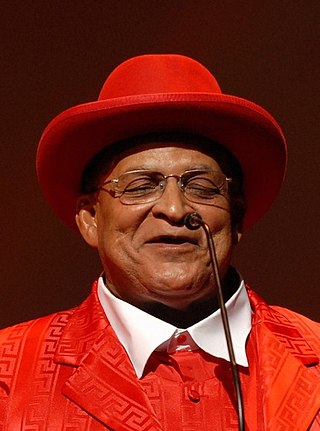Related Research Articles

Lincoln Barrington "Sugar" Minott was a Jamaican reggae and dancehall singer, record producer and sound-system operator.

Ernest Ranglin is a Jamaican guitarist and composer who established his career while working as a session guitarist and music director for various Jamaican record labels, including Studio One and Island Records. Ranglin played guitar on many early ska recordings and helped create the rhythmic guitar style that defined the form. He has worked with Theophilus Beckford, Jimmy Cliff, Monty Alexander, Prince Buster, the Skatalites, Bob Marley and the Eric Deans Orchestra. Ranglin is noted for a chordal and rhythmic approach that blends jazz, mento and reggae with percussive guitar solos incorporating rhythm 'n' blues and jazz inflections.

Gregory Anthony Isaacs OD was a Jamaican reggae musician. Milo Miles, writing in The New York Times, described Isaacs as "the most exquisite vocalist in reggae".
Delroy George Wilson CD was a Jamaican ska, rocksteady and reggae singer. Wilson is often regarded as Jamaica's first child star, having first found success as a teenager. His youngest son, Karl "Konan" Wilson, has found success as part of British duo Krept and Konan.

Edward O'Sullivan Lee OD, better known as Bunny "Striker" Lee, was a Jamaican record producer. He was known as a pioneer of the United Kingdom reggae market, licensing his productions to Trojan Records in the early 1970s, and later working with Lee "Scratch" Perry and King Tubby.
The Chantells were a Jamaican reggae group from the latter half of the 1970s.
The Melodians are a rocksteady band formed in the Greenwich Town area of Kingston, Jamaica, in 1963, by Tony Brevett, Brent Dowe and Trevor McNaughton. Renford Cogle assisted with writing and arranging material.

Marcia Llyneth Griffiths is a Jamaican singer. One reviewer described her by noting "she is known primarily for her strong, smooth-as-mousse love songs and captivating live performances".
Channel One is a recording studio in Maxfield Avenue, West Kingston, Jamaica. The studio was built by the Hoo Kim brothers in 1972, and has had a profound influence on the development of reggae music.

Philip Thomas, better known as Cutty Ranks, is a Jamaican dancehall singer.

Earl "Chinna" Smith, a.k.a. Earl Flute and Melchezidek the High Priest, is a Jamaican guitarist active since the late 1960s. He is most well known for his work with the Soul Syndicate band and as guitarist for Bob Marley & the Wailers, among others, and has recorded with many reggae artists, appearing on more than 500 albums.
Linval Roy Carter, better known as Prince Jazzbo, was a Jamaican reggae and dancehall deejay and producer.

Patrick George Anthony Barrett, better known by his stage name Tony Rebel, is a Jamaican reggae deejay.
Tommy Cowan CD is a producer and singer, initially working in reggae but later concentrating on gospel, who has been involved in the music business since the 1960s. He is also an ordained Gospel minister and a justice of the peace.

Kevin Anthony Jackson, also known by his stage name Sanchez, is a Jamaican reggae singer-songwriter and record producer.
Audrey Hall is a Jamaican reggae singer.
Felix Headley Bennett OD, also known as Deadly Headley, was a Jamaican saxophonist who performed on hundreds of recordings since the 1950s.
Norman Washington Jackson, better known as Tiger, is a Jamaican dancehall musician active since the late 1970s. He is known for his growling style of deejaying, often imitated by other dancehall deejays since his initial rise to fame.

Wayne Ford Levy, known by his stage name Exco Levi, is a Brampton-based, Jamaican-Canadian reggae musician. Levi has won five Juno Awards.
Richard Patrick Bennett, better known by the stage name Charlie Chaplin, is a Jamaican dancehall and ragga singer and deejay. It was common for Jamaican deejays of the era to name themselves after film stars or characters. Bennett, however, had been nicknamed after the comedian since his youth. His career began in 1980 when he began working with U-Roy's Stur-Gav Hi-Fi collective. He became extremely popular throughout Jamaica, memorable for his focus on cultural and social themes instead of the "slack" lyrics that were popular at the time. His popularity as a live performer prompted Roy Cousins to produce some recording sessions with the young DJ. Chaplin's debut album was the Cousins-produced Presenting Charlie Chaplin in 1982, with several albums following for the producer over the next three years.
References
- 1 2 3 Larkin, Colin (1998) "The Virgin Encyclopedia of Reggae", Virgin Books, ISBN 0-7535-0242-9
- 1 2 Barrow, Steve & Dalton, Peter (2004) "The Rough Guide to Reggae", Rough Guides, ISBN 1-84353-329-4
- 1 2 Thompson, Dave (2002) "Reggae & Caribbean Music", Backbeat Books, ISBN 0-87930-655-6
- 1 2 "Reggae Producers - The Big 5 Archived March 13, 2008, at the Wayback Machine ", Jamaica Observer, 2 March 2008
- 1 2 Henry, Davina (2013) "Penthouse Celebrates 25 Years", Jamaica Gleaner , 13 October 2013. Retrieved 13 October 2013
- ↑ White, Nadine (2013) "Donovan Germain blasts current state of dancehall music", Vision newspaper, 24 June 2013. Retrieved 25 July 2014
- ↑ Campbell, Howard (2014) "Winkler, Germain and Gussie get medals", Jamaica Observer , 9 October 2014. Retrieved 9 October 2014
- ↑ Johnson, Richard (2014) "Musgrave Winners Lauded", Jamaica Observer , 23 October 2014. Retrieved 23 October 2014
- ↑ Campbell, Howard (2015) "Ronnie Burke heads field of distinction", Jamaica Observer , 7 August 2015. Retrieved 15 August 2015